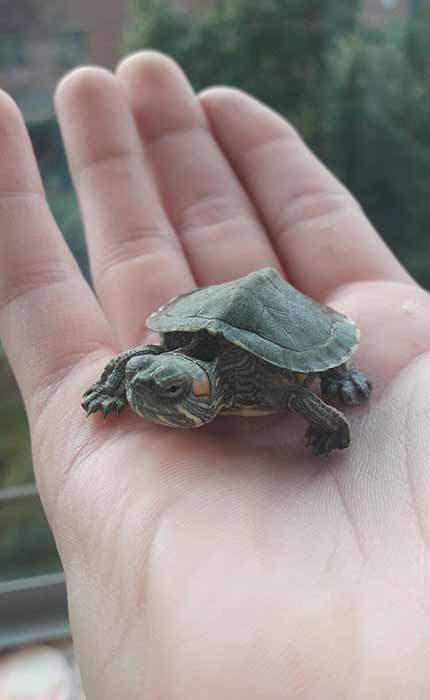Sulcata tortoises and their dietary preferences can be very strange, sometimes tortoises will eat everything that is in front of them (even if they shouldn’t) and other times they will become some of the pickiest eaters in the world. But how do they feel about oranges?
Sulcata tortoises shouldn’t eat oranges. Oranges contain citric acid, which can irritate the intestines of the tortoise. Oranges also contain phosphorus, which can be harmful in high quantities.
Oranges are good and bad at the same time. They are good due to the high quantities of vitamins they contain, like B6 and C, but at the same time they are bad due to the high amount of phosphorus and citric acid.
Citric acid can be fund in all citric, lemons, lime, grapefruit, pomelo, etc. most other fruits don’t contain any citric acid. But what they do contain is phosphorus, which can be even more harmful than citric acid.
The Calcium Phosphorus Ratio of an Orange
Almost all fruits contain calcium and phosphorus. And as a result, most of them have a calcium to phosphorus ratio. So let’s take a look at what calcium does for tortoises, what phosphorus does for them and what is a good calcium to phosphorus ratio.
Calcium is essential for every animal in this world that has bones. And since the shell of a tortoise is made out of bones, calcium is even more important for tortoises than for any other animal. Fruits are one of the main sources of calcium that a tortoise has, so making sure that you feed them vegetables with high amounts of calcium is important.
For humans, phosphorus is a very important mineral that helps filter waste, repairing tissue and cells, etc. But for tortoises, phosphorus is not that great. Phosphorus is what gives tortoise shells a little flexibility, which is great because this little extra flexibility makes them more resistant to bites and other types of impact. But too much phosphorus can also make the shell a lot softer, and as a result much weaker when it comes to defending the tortoise from predators.
In short, we can say that calcium is great for tortoises and phosphorus is not so great for tortoises in high quantities.
Most fruits have a calcium to phosphorus ratio, this ratio can be 1:1, 2:3, 5:2, 1:2, etc.
A 1:1 ratio means that the amount of calcium is equal, or almost equal, to the amount of phosphorus. So a vegetable with this ratio is not that great for tortoises, but it’s not harmful either. But if possible, such a vegetable should be avoided.
A 1:2 calcium to phosphorus ratio is really bad, there are not many vegetables with this ratio, so don’t worry too much about them. Just remember that if a vegetable has more potassium than calcium, you should keep it away from your tortoise.
A 2:1 ratio is great, and this is what you should be aiming for. If the ratio goes higher, it’s ok, but ideally this is the ratio that you are looking for.
Oranges have a 1.1:1 ratio, which is not ideal. But at the same time, it’s manageable. And of course depending on the way the oranges have been grown the ratio will look a little different from, but overall it should still be in the same area.
Here is a short list with some fruits that have a high phosphorus content and should be avoided in large quantities:
Here is a list of some of the most common vegetables and their Calcium to Phosphorus ratio:
- Grapes – 1.4:1
- Apples – 1.1:1
- Pineapple – 1:1
- Mango – 1:1
- Pears – 0.8:1
- Strawberries – 0.8:1
- Guavas – 0.8:1
- Cherries – 0.8:1
- Apricots – 0.7:1
- Blueberries – 0.6:1
- Peaches – 0.5:1
- Bananas – 0.3:1
- Plums – 0.3:1
How Much and How Often You Should Give Your Sulcata Tortoise Oranges
While oranges don’t have the best calcium phosphorus ratio, they still have a lot of beneficial vitamins, so they shouldn’t be excluded from the diet of your tortoise entirely. They should be treated more as a snack or reward than a staple in their diet.
I feed my adult tortoise about two oranges per week. And I would recommend you to do the same.
If your tortoises have a balanced diet, a couple of oranges per week won’t do them any harm, and it will allow them to benefit from all the good parts of the strawberry.
If you have a younger tortoise, you should reduce the amount to one per week.
Now let’s see what are the benefits of a strawberry for a tortoise.
What to Do If Your Tortoise Doesn’t Eat Fruits
The first thing that you have to do is to determine the cause. And there are two possibilities.
One possibility is that your tortoise simply doesn’t like some fruits, one of my tortoises is exactly the same.
In this case, I would recommend you to try different fruits until you find one that your tortoise likes. You should start with apples, grapes, pears and strawberries, all of them (maybe not the strawberries) are quite cheap and can be found at every supermarket. And all taste different, so your tortoise should find at least one fruit that it likes.
But if your tortoise refuses to eat any kind of fruit, then you have a problem, as fruits can’t be completely removed from their diet. If this is your problem, you should start replacing some of the food that you usually give your tortoise with fruits. And it shouldn’t take more than two or three weeks until your tortoise will start eating fruits.
Another possibility is that your tortoise is too young. It’s not uncommon for baby and juvenile tortoises to not eat certain fruits. When tortoises are at those life stages they are growing a lot faster than adult tortoises, and to grow this fast they need a lot of protein that they get from greens like: spinach, watercress and cabbage. Eating oranges, while it will keep them from starving, it won’t do them too much good at this point.
If your tortoise is young, then it’s perfectly normal that it won’t eat fruits. Just wait until it reaches maturity, then you can try again to feed it oranges.
If you are not sure how old your tortoise is, then read this article: How Long do Tortoises Live?, there you will find a few methods that will help you approximate the age of your tortoise.
Final Thoughts
Sulcata Tortoises shouldn’t eat oranges, but they can eat other fruits. Just be careful not to give your tortoise too many fruits, since they can be bad if consumed in excess.
I hope this article answers all your questions, but in case you have any questions left, you can always leave them in the comment section and I will answer them as soon as possible.


